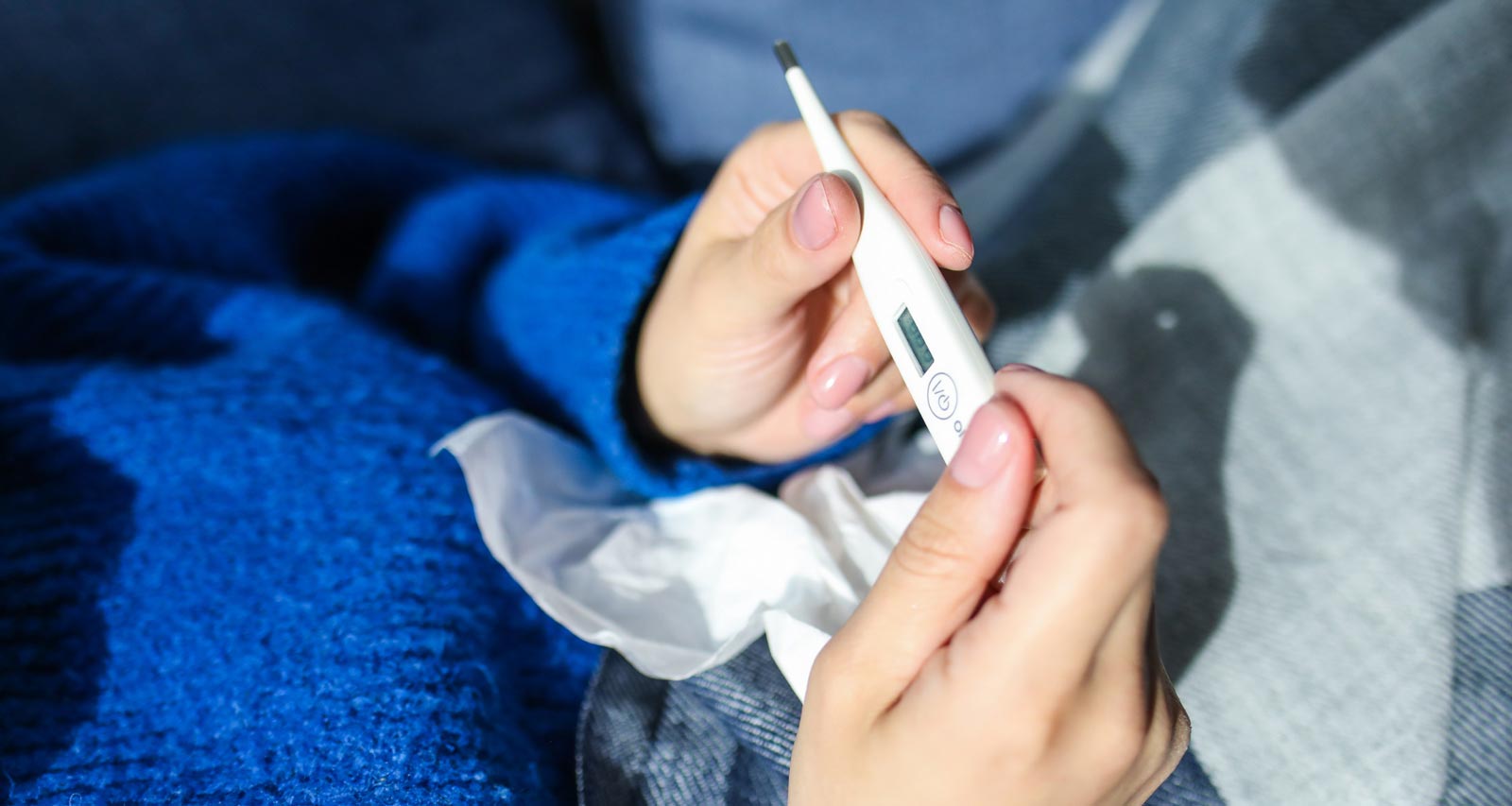Many people who experience morning congestion commonly ask themselves, “Why am I waking up with phlegm?” Phlegm in your throat is a common and bothersome physical condition that can occur after a night’s sleep. It can disrupt your morning routine, leaving you with questions about its potential causes and why it’s forming.
By exploring the reasons why you may be waking up this way, we can shed light on possible triggers to help you understand, manage, and prevent this discomfort for a more peaceful start to your day.
Why Am I Waking Up with Phlegm in My Throat?
While having morning phlegm in your throat is common, it may also signal an underlying issue. Morning coughing fits may also occur as a result, making it an uncomfortable way to start your day. Coughing is your body’s way of trying to rid itself of excess mucus.
When you wake with excessive morning phlegm, the reasons for your morning cough fits are similar:
Postnasal Drip
One of the most common causes of morning phlegm is postnasal drip. Excess mucus from the nasal passages drips down the back of the throat while you sleep. This can be triggered by allergies or respiratory infections, leading to that annoying morning phlegm.
Postnasal drip is when mucus from the nasal cavities accumulates in the throat overnight. People with allergies and other respiratory conditions can easily develop postnasal drip. It often leads to an urge to cough in the morning as your body attempts to clear the mucus.
Gastroesophageal Reflux Disease (GERD)
Another common reason is gastroesophageal reflux disease (GERD). When stomach acid flows back into the esophagus, it can irritate the throat and cause the production of excess mucus, especially during nighttime hours when you’re lying down.
GERD is another potential cause of morning coughing fits. When stomach acid flows back into the esophagus, it can irritate the throat and cause coughing, particularly in the early hours. Lying down at night can worsen this condition, as it keeps stomach acid down.
Asthma
Morning coughing fits are often linked to asthma, and this correlation can be attributed to several factors. People with asthma can experience heightened symptoms during the evening hours, leading to increased inflammation and airway mucus production.
As the night progresses, these symptoms can worsen, causing the airways to become even more constricted. Upon waking in the morning, individuals with asthma might find themselves in a state of increased airway sensitivity and inflammation, resulting in coughing fits as the body attempts to clear the air passages and gain oxygen.
Smoking and Environmental Irritants
Smoking and exposure to environmental irritants can also lead to excessive mucus symptoms and make morning phlegm worse. According to the American Lung Association, smoking produces thicker mucus and increases its production in your airways— making it even harder for you to breathe. Outdoor elements like dry air quality and pollutants can also contribute to morning phlegm.
Is There a Difference Between Phlegm and Mucus?
Phlegm and mucus are terms often used interchangeably, but there is a subtle distinction between the two.
What is Mucus?
Mucus is a clear, viscous, and gel-like substance produced by the mucous membranes throughout the body. Mucus has vital functions, such as trapping and removing foreign particles, lubricating body tissues, and protecting against infections. Mucus is a continuous presence in the respiratory and digestive systems, helping to maintain their health and functionality.
What is Phlegm?
Phlegm is a specific type of mucus in your lungs produced in the respiratory system. It’s thicker, stickier, and often has a more opaque or cloudy appearance compared to typical mucus. Phlegm plays a role in trapping and removing inhaled irritants, like dust, bacteria, and viruses, from the airways.
When you have a cold, respiratory infection, or other conditions, the body can produce excess phlegm as a protective response. This can lead to symptoms like coughing, throat clearing, and the sensation of phlegm in the throat.
Mucus vs. Phlegm: What’s the Difference?
People often use the terms "mucus" and "phlegm" interchangeably, especially when discussing respiratory symptoms. Both substances play vital roles in maintaining respiratory health.
| Mucus | Phlegm |
|---|---|
|
Main mucus category |
Type of mucus |
|
Clear, gel-like substance |
Thick, sticky cloudy substance |
|
Produced in mucus membranes throughout the body |
Produced only in respiratory systems |
|
Continuously present to maintain body health and functionality |
Caused by illnesses, like respiratory infections, colds, and underlying issues |
|
Protects the overall body |
Protects the respiratory system |
While mucus serves broader functions throughout the body, phlegm is a specific type of mucus produced to protect the respiratory system.
Treatments for Excess Phlegm in the Bronchial Passageway
Now that you know the answer to, “Why am I waking up with phlegm?” the next step is to understand the different treatment options available. The treatment for excess phlegm in the chest depends on the underlying cause.
Symptom Relief Medication
If it’s nasal congestion due to upper respiratory allergies, managing them or treating the sinus condition can help alleviate symptoms. An option like Mucinex® Sinus-Max® Severe Nasal Congestion Relief Sinus & Allergy Nasal Spray offers fast-acting nasal congestion relief in just one dose that can last for up to 12 hours and can be used every 10-12 hours.
Over-the-counter (OTC) Cold and Flu Medication
If your excess phlegm is caused by a cold or flu, use the necessary strategies to make yourself more comfortable. Also, use a trusted OTC medicine, such as Maximum Strength Mucinex® Fast-Max® Cold & Flu (All-in-One) Liquid.
Lifestyle and Dietary Changes with OTC GERD Medication
In the case of GERD, lifestyle modifications, dietary changes, and medications can be effective in reducing acid reflux and the associated phlegm.
According to the University of Michigan Health, people with GERD should avoid highly spiced foods, citrus beverages, carbonated drinks, gum, and coffee. These can irritate your stomach, causing it to pour out acid and flow up your esophagus.
Additionally, they state that being overweight can contribute to worsening GERD symptoms, especially if you have morning phlegm. Diet modifications and routine exercise can better treat and manage these conditions for people with GERD.
Asthma Prescribed Medication
For individuals with asthma, managing their symptoms with prescribed medication and proper asthma care can help control mucus production.
If there is any question or concern regarding the reason for your excess phlegm, contact a healthcare professional to determine the underlying cause and tailor the treatment approach to your specific condition.
Why Is My Cough Worse In The Morning?
If you’re wondering “Why am I waking up with phlegm and a morning cough?”, it may be a result due to excessive phlegm. Coughing up mucus and phlegm can be caused by various factors, primarily due to the body's overnight processes. When we sleep, mucus and phlegm can accumulate in the respiratory passages, causing congestion.
And, while sleeping, the body's natural mechanisms for clearing mucus may slow down. As we wake up, the excess mucus becomes more challenging to clear, leading to a cough in the morning.
Cool and dry air in your sleeping environment can irritate the airways and trigger coughing. The body's circadian rhythms can also play a role, with lung function often at its lowest point in the early morning, making cough symptoms more pronounced.
Understanding these factors can help you manage your morning cough and find effective ways to alleviate it.
How Do I Stop Waking Up with Phlegm?
Waking up with phlegm in your throat can be both unpleasant and disruptive to your morning routine. To reduce or eliminate this discomfort, there are many strategies you can implement:
Stay Hydrated
Ensuring you're adequately hydrated throughout the day can help thin mucus and prevent its accumulation at night. Have a goal to drink plenty of water and consider incorporating warm, soothing beverages like herbal teas into your daily routine.
Elevate Your Head
Adjusting your sleeping position by elevating the head of your bed or using extra pillows can help prevent postnasal drip and acid reflux— two common causes of morning phlegm. These positional changes can reduce the likelihood of mucus pooling in your throat while you sleep. Elevate the head of your bed or use an extra pillow to prevent postnasal drip.
Address Underlying Conditions
If you have allergies, acid reflux (GERD), or other respiratory conditions, manage and treat these conditions with the help of a healthcare professional. Identifying and addressing the underlying cause of excess phlegm is a crucial step in preventing it from accumulating overnight.
Eliminate Allergies & Irritants
Do your best to avoid allergens in the bedroom if you are particularly sensitive to them. Ensure the area is well-dusted and that pet dander is managed to reduce the possibility of waking up with phlegm in the throat.
Practice Good Sleep Hygiene
When you consistently get a restful night’s sleep, your body is more capable of fighting off infection and building resistance to viruses. Aim to keep a regular sleep schedule to maximize your body’s natural immunity.
Consult a Healthcare Professional
If symptoms persist, consult a healthcare provider to diagnose your condition and receive recommendations for morning phlegm— especially if it worsens over time. Waking up with phlegm in the throat can result from various factors, including postnasal drip, acid reflux, allergies, or respiratory infections.
Addressing the underlying cause is essential for effectively managing phlegm in the throat. This way you can wake up feeling refreshed and free from this nuisance.
- American Journal of Physiology (2015), Circadian molecular clock in lung pathophysiology
- American Academy of Otolaryngology-Head and Neck Surgery (2018), Post-nasal Drip
- American Lung Association (2021), Understanding Mucus in Your Lungs
- Cleveland Clinic (2022), Phlegm and Mucus: How to Get Rid of It
- University of Michigan Health (2022), Laryngopharyngeal Reflux










